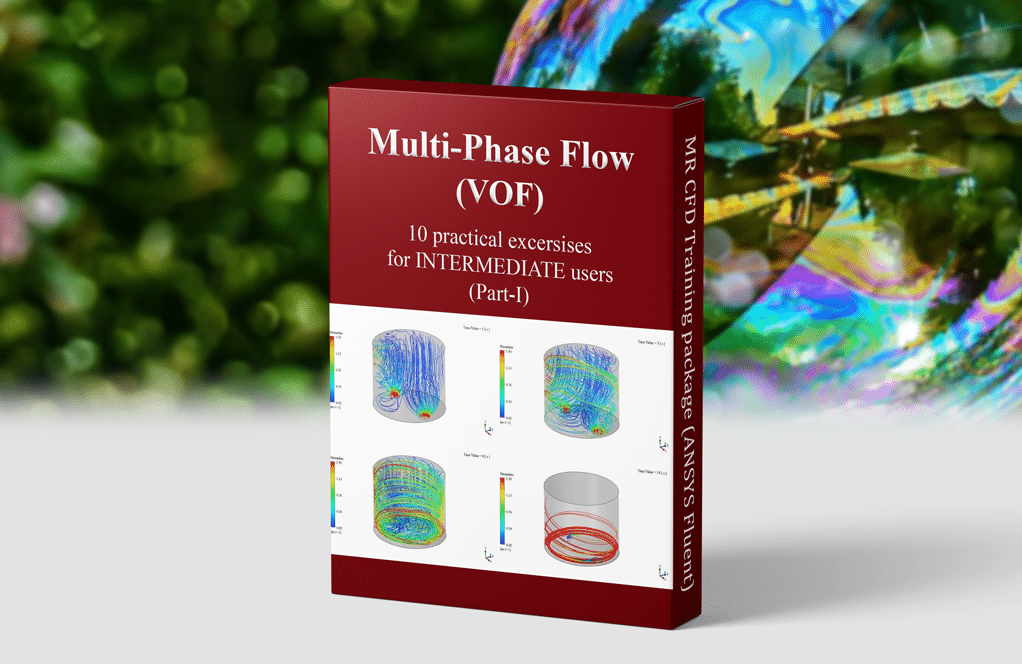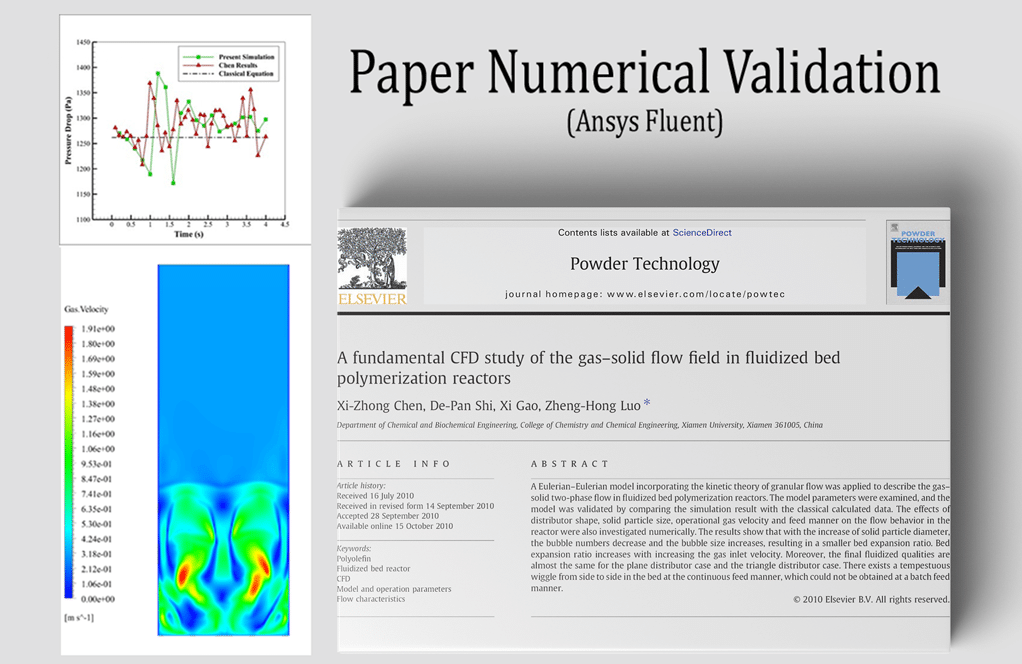Volume of Fluid (VOF), Package for Intermediate, Part 1, 10 Learning Products
Original price was: $825.00.$92.00Current price is: $92.00. Student Discount
This CFD training package is prepared for intermediate users of Ansys Fluent software in the Volume of Fluid (VOF) Multi-phase areas.
Click on Add To Cart and obtain the Geometry file, Mesh file, and a Comprehensive ANSYS Fluent Training Video.To Order Your Project or benefit from a CFD consultation, contact our experts via email ([email protected]), online support tab, or WhatsApp at +44 7443 197273.
There are some Free Products to check our service quality.
If you want the training video in another language instead of English, ask it via [email protected] after you buy the product.
Description
Multi-phase Volume of Fluid (VOF) – ANSYS Fluent Training Package, 10 Practical Exercises for INTERMEDIATE Users
This CFD training package is prepared for intermediate users of Ansys Fluent software in the Volume of Fluid (VOF) Multi-phase areas. You will learn and obtain comprehensive training on how to simulate medium projects. The achieved knowledge will enable you to choose the most appropriate modeling approaches and methods for applications and CFD simulations.
This package trains the necessary proficiency you will require to start doing average computational fluid dynamics (CFD) VOF Multiphase simulations on your own using Ansys Fluent software. Qualified training movies and comprehensive CFD concepts explanations, including setup, solution, results, and all perspectives of carrying out CFD simulations in Ansys Fluent.
Bubbles
In project number 1, a numerical simulation of bubbles’ motion under the water on a plate with and without shear stress has been done. The VOF model has been used to simulate and solve the two-phase flow field equations. This project aims to consider the effect of surface tension in simulations where the free surface in phase is investigated.
In project number 2, numerical simulations of air bubbles under a water column with two different surface tension have been done. The VOF model has been used to simulate and solve the two-phase flow field equations. The two modes in this project are simulated and compared.
Tank (volume of fluid)
Project number 3 simulates the water discharge of a rectangular tank under the influence of gravity. The VOF model has been used to simulate and solve the two-phase flow field equations. The computational domain consists of three tanks that are connected by pipes.
Project number 4 simulates the tank filling. The goal of many operations in the chemical industry is to separate the components of a solution or mixture from each other or to obtain a pure substance from a combination of two or more components. In this Tank Filling simulation, using the VOF (volume of fluid) method, the interaction of three phases, including water, alcohol, and air was investigated. For this purpose, the effect of shear forces on the boundary between the phases was applied by applying surface stresses between the two phases.
In project number 5, Ansys Fluent software has been used to simulate the water discharge of a rotating tank. The Volume of Fluid (VOF) model has been used to simulate and solve the two-phase flow field equations. The primary phase is air and the secondary phase is water. The Tank rotates about the Y-Axis at an 80 rev/min speed. There are two circular orifices in the bottom of the Tank that water discharges from them.
Project number 6 simulates the tank filling. In this project, we simulate Tank charge/filling (2-phase) between two reservoirs with fluid air and water and the Same height of tanks. The goal of many operations in the chemical industry is to separate the components of a solution or mixture from each other or to obtain a pure substance from a combination of two or more components. In this Tank Filling simulation, using the VOF (volume of fluid) method, the interaction of two phases, including water and air, was investigated.
Venturi
The venturi effect reduces the pressure in the fluid when the fluid passes through the narrow part of the pipe. In project number 7, a two-phase CFD simulation of airflow inside a Venturi using the VOF model, and accurate modeling of air bubbles as a separate phase in water is carried out. After passing this stream through the bottleneck, the flow rate increases, and its pressure decreases. This pressure drop causes air to be sucked out of the hole located in the venturi throat. As air is added to the stream, the amount of air volume fraction increases.
Siphon
Water always flows from an area under higher pressure to an area of lower pressure. The siphon effect occurs when the fluid flows to the highest portion of the bend pipe due to the pressure difference and then comes down from there due to gravity. In project number 8, Ansys Fluent software used a Numerical simulation of a siphon. The VOF model has been used to simulate and solve the two-phase flow field equations. The flash tank discharges and the siphoning effect causes the water to drain.
Monometer (volume of fluid)
In project number 9, we simulated the monometer and it has been shown how there is variation in U-tube manometric fluid column. The multi-phase VOF model has been used. A convergent and divergent nozzle has been used to create a pressure difference. One end of the manometer is attached at the throat and the other at the converging section. There is a rise in the liquid column in the U- tube manometer in the low-pressure region.
Absorption
Project number 10 simulates the absorption of ammonia in the air inside an absorption tower. The adsorption process is one of the methods of separating the components of a gas mixture placed in a solvent (liquid phase). One of the applications of absorption towers in refineries is to separate ammonia from gas. In this simulation, the VOF multiphase flow model is used; So that the airflow contains one percent ammonia, and liquid water is considered a solvent.














Dr. Blaise Huel –
I’ve been using the ‘VOF, Package for Intermediate, Part 1’ for my recent projects. The range of simulation setups provides a solid understanding of multiphase flow problems. Moreover, the training has elevated my confidence in handling CFD for tanks and Venturi simulations. Great content!
MR CFD Support –
Thank you for your kind words! We’re thrilled to hear that our VOF package has been instrumental in advancing your skills in multiphase CFD simulations, especially with tanks and Venturi flow problems. At MR CFD Company, we aim to provide comprehensive and practical learning experiences. It’s rewarding to know we’re achieving that goal. If you have any further needs or dive into more advanced topics, we’re here to help!
Viviane Runolfsson –
I’m impressed by the variety of multiphase flow problems covered in this package. Each project seems to offer a direct application of the VOF method to different engineering scenarios, which can enhance a learner’s understanding significantly. The detailed explanations and comparisons in different projects regarding phase interactions, surface stress, and fluid dynamics appear to be outstanding learning tools for intermediate users.
MR CFD Support –
We sincerely appreciate your positive feedback and are glad to know that our Volume of Fluid (VOF) package has met your expectations. It’s gratifying to hear that the diversity of case studies and the depth of the content are providing a valuable learning experience. Thank you for choosing our learning products to broaden your understanding of multiphase CFD simulations!
Prof. Candelario Bosco PhD –
This package seems comprehensive! Does the instructional material also include common troubleshooting steps for dealing with convergence issues in VOF simulations?
MR CFD Support –
Thank you for your interest! Yes, the training package includes guidance on managing common convergence issues. This entails instructions on techniques such as adjusting under-relaxation factors, refining meshes, and applying suitable physical models to ensure reliable VOF multiphase simulations.
Ted Romaguera –
Fantastic training package with a great variety of intermediate level exercises! I especially enjoyed the hands-on approach with multiple applications ranging from tank dynamics to Venturi effects and siphon phenomena. The videos were super helpful in understanding the simulations from setup to results interpretation.
MR CFD Support –
Thank you for your positive feedback! It’s great to hear that you found the Volume of Fluid training package comprehensive and the videos helpful. We’re glad the range of exercises enriched your learning experience. If there’s anything else you’d like to explore or if you have questions in the future, please don’t hesitate to reach out.
Caesar Sanford –
This package sounds very thorough. Do you need to use your own geometry and mesh for these exercises, or are they provided within the learning package?
MR CFD Support –
All the geometries and meshes required for the practical exercises are provided as part of the learning package, so you do not need to create your own. The package is designed to offer a comprehensive training experience that allows you to focus on learning the simulation aspects using Ansys Fluent software.
Mckenna Dibbert –
I’ve gone through part 1 of the VOF course and the level of detail is impressive. Could you offer some guidance on how to best approach setting up multiple phases in a VOF simulation to ensure numerical stability while capturing the necessary physics?
MR CFD Support –
We’re glad to hear that you’re progressing well with the VOF course! To ensure numerical stability when setting up multiple phases in a VOF simulation, it is important to refine the mesh where the phases meet, employ relaxation factors, and make sure the courtyard velocity is under a certain threshold. Moreover, proper selection of the volume fraction scheme can be a crucial factor. It is recommended to start with a smaller timestep and increase it cautiously as the simulation progresses. The training package also provides more specific guidelines on these aspects to better help you capture the essential physics in your simulations.